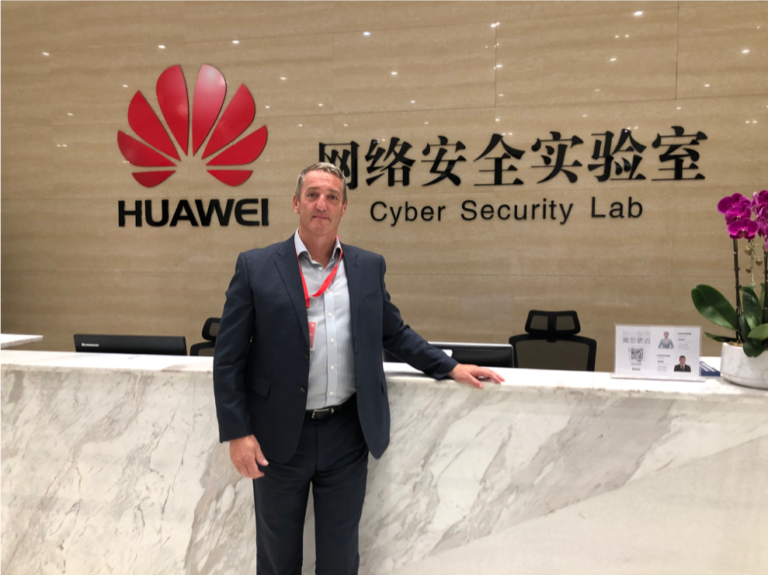Bad boys of tech? Rhetoric around Huawei is helping no-one
4th June 2019

As a strategic partner of Huawei and having spent the last week with their team in China, I wanted to reflect on the role of the company in driving forward technological advancement in light of the current storm surrounding the brand.
Go back only as recently as last Christmas, and Huawei, for most people, were nothing more than a Chinese smartphone manufacturer with a small but committed user-base. And that’s just the people that’d even heard of them. Fast-forward to today and you’ll be hard-pressed to find anyone that doesn’t know or have an opinion on this brooding, Far Eastern tech giant.
Huawei gained notoriety for more than just their remarkably high-quality smart-devices back in April when information relating to a UK National Security Council meeting was leaked. The meeting had been organised to discuss the progression of 5G technology throughout the British Isles and how Huawei were to have a pivotal role in supporting with development. With Huawei being a transcontinental company struggling to contain a series of lesser known but ongoing controversies, their involvement was, at the time, stamped as ‘Confidential’. Nevertheless, the information filtered into the public domain and Defence Secretary, Gavin Williamson, the individual accused of the breach, was relieved of all his governmental duties.
By the time news of Williamson’s P45 had hit the media, Huawei was the brand on everyone’s lips. More though was to come. Much more.
Superpowers square up
To say that relations between the US and China have been frosty in recent years would be something of an understatement. China’s desire to break into American markets was to collide with an increasingly protectionist US administration and to the surprise of absolutely nobody, things quickly soured. Up until recently, hostilities had represented themselves as a series of retaliatory tariff applications that proved more of a nuisance to each other than anything. However, when Huawei’s involvement in the British roll-out of 5G surfaced, the US escalated matters by adding the company to a list of organisations that American firms cannot trade with unless they have a specific licence.
Spooking the American administration was a recently enacted Chinese law stating that their organisations and businesses must “support, co-operate with and collaborate in national intelligence work”. The sanction means that Huawei could potentially be blocked from accessing Google services which would impact heavily on the functionality of their smartphones and so, inevitably, future sales.
This ramping up of diplomatic aggression has led to some describing the current impasse between the two countries as a ‘tech cold war’.
How do you solve a problem like Huawei?
Because this is a problem that very much needs solving. Originally a manufacturer of just components to smartphones, Huawei began developing their own devices and soon acquired an almost cult following. Such has been their growth since, they are now the second largest smartphone manufacturer in the world with only Samsung pipping them to top spot.
In short, they have a lot of customers. A lot of lives and businesses relying on their products. Huawei have claimed that this latest move by the incumbent US administration was one they’ve seen coming hence the reason they have their own downloadable app gallery, their smartphones are powered by Huawei processors, and, according to senior figures, they have developed their own operating system to roll-out as a ‘Plan B’. But still, even the most optimistic Huawei advocate will admit that there are few positives that can be gleaned from the company being shut out of the American market altogether.
Changing the tone
Although it’s obviously not the cause of the diplomatic breakdown, the rhetoric surrounding Huawei hasn’t exactly been helpful. The casual reader could be forgiven for thinking the company is some shady government conspiracy, making cheap phones as a front for stealing state secrets. That summation though, does a great disservice to a company demonstrating some of the best practice anywhere on Earth.
Huawei employ 180,000 people of whom 80,000 work specifically within Research and Development, a proportion that dwarfs that of most other comparable companies. As well as manpower, of their $100bn annual revenue, Huawei invest 15% of it back into R&D every year. This is company that puts its money where its mouth is when it comes to invention and innovation.
The commitment Huawei demonstrate to innovation and acquisition of market share is rewarded with staunch customer loyalty. In the UK, many carriers, hundreds of ISPs and thousands of public and private sector organisations continue to use their products deemed as they are to be robust, well-supported and economical to deploy and maintain. Indeed, as proud Huawei partners ourselves, the support Connectus has received with pre-sales, technical architecture and post implementation support is better than any vendor we have done business with to date.
There’s also the fact that, by virtue of being a hot news item, controversies involving Huawei are magnified to the benefit of other tech companies whose own controversies are all but ignored. Silicon Valley heavyweight, Cisco, for example has been forced to disclose more than 10 vulnerabilities in just the last two years that included the presence of hardcoded or default credentials in a range of its products. With Huawei taking the heat off pretty much everybody else, the likes of Cisco have avoided the scrutiny these recent calamities would normally attract.
Of course, far important than a relaxing of the tone used within media coverage, is that the tone of conversations taking place around negotiating tables is similarly relaxed. Recent comments from President Trump have hinted that Huawei could be involved in a future trade agreement, acknowledging the importance of their involvement should the US wish to adopt 5G too. Amidst a cacophony of tariffs, sanctions and hostile rhetoric, it is a significant olive branch and one that, hopefully, Huawei grasp with good faith.
It is no exaggeration to say that Huawei have a vital role to play in the technological advancement of mankind. We can only hope that international relations act as a conduit to their involvement in this process, and not a barrier.












